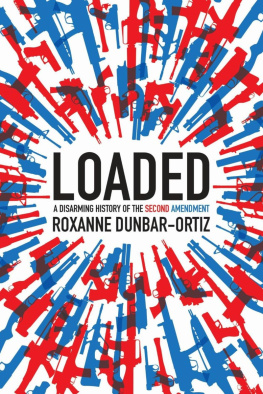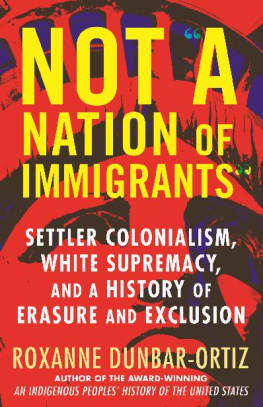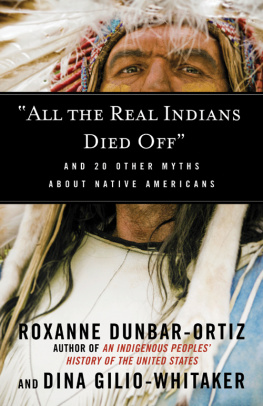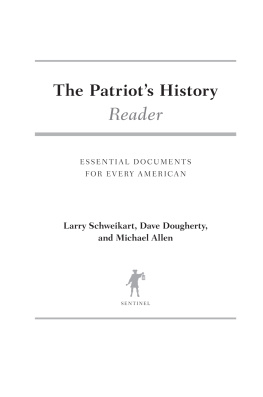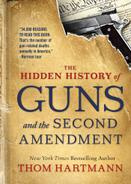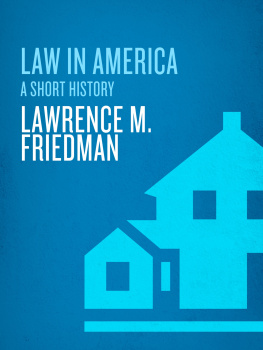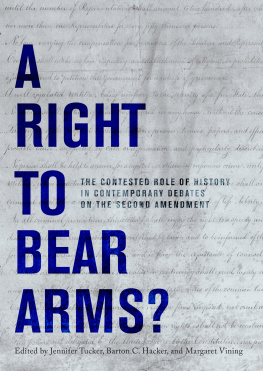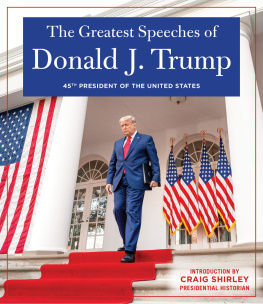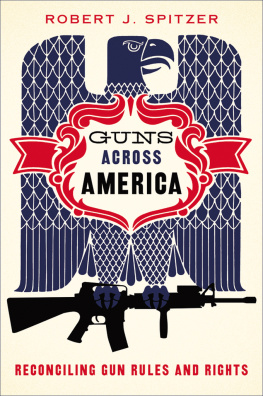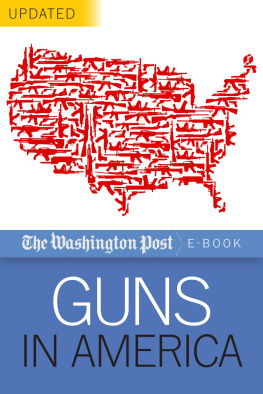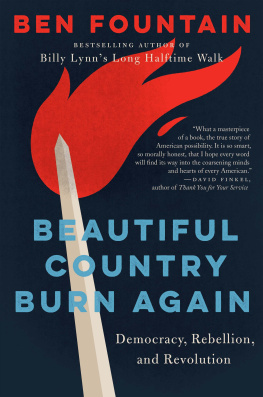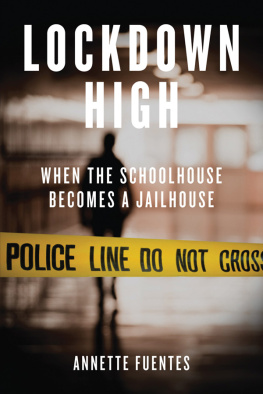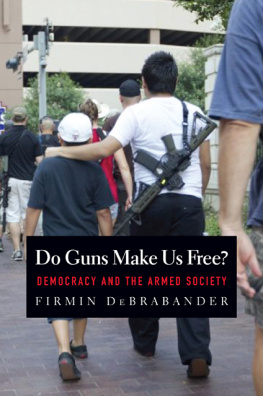PRAISE FOR LOADED: A DISARMING HISTORY OF THE SECOND AMENDMENT
Roxanne Dunbar-Ortiz is a major spokesperson for what might be called the new exceptionalism. Instead of viewing the United States as a model that other nations should imitate, a new generation of historians finds the United States to be a society founded on genocide, slavery and male domination, and permeated by hatred toward those who are different. In her earlier book, An Indigenous Peoples History of the United States, Ortiz argued that the legacy of its Indian wars shaped the United States military practices in, for example, the Philippines. Now, in Loaded, she widens her lens to propose that the addiction to violence characteristic of American domestic institutions also derives from the frontiersmans belief in solving problems by killing. Whether expressed in individual cruelty like the collection of scalps or group barbarism by settler colonialists calling themselves militias, violence has become an ever-widening theme of life in the United States.
Staughton Lynd
For anyone who believes we need more than thoughts and prayers to address our national gun crisis, Loaded is required reading. Beyond the Second Amendment, Roxanne Dunbar-Ortiz presents essential arguments missing from public debate. She forces readers to confront hard truths about the history of gun ownershiplinking it to ongoing structures of settler colonialism, white supremacy, and racial capitalism. These are the open secrets of North American history. It is our anxious denial as much as our public policies that perpetrate violence. Only by coming to peace with our history can we ever be at peace with ourselves. This, for me, is the great lesson of Loaded.
Christina Heatherton, co-editor of Policing the Planet: Why the Policing Crisis Led to Black Lives Matter
Roxanne Dunbar-Oritzs Loaded argues U.S. history is quintessential gun history, and gun history is a history of racial terror and genocide. In other words, gun culture has never been about hunting. From crushing slave rebellions to Indigenous resistance, arming individual white settler men has always been the strategy for maintaining racial and class rule and for taking Indigenous land from the founding of the settler nation to the present. With clarity and urgency, Dunbar-Ortiz asks us not to think of our current moment as an exceptional era of mass-shootings. Instead, the very essence of the Second Amendment and the very project of U.S. settler democracy has required immense violence that began with Indigenous genocide and has expanded to endless war-making across the globe. This is a must read for any student of U.S. history.
Nick Estes, author of the forthcoming book Our History Is the Future: Mni Wiconi and Native Liberation
Trigger warning! This is a superb and subtle book, not an intellectual safe space for confirming your preconceptionswhatever those might bebut rather a deeply necessary provocation. Roxanne Dunbar-Ortiz has done it again, giving us a fluid and sweeping history of the many painful contradictions that are the deep history of Americas lovehate relationship with firearms. In understanding that history, Loaded also unpacks the contemporary pathologies of both fanatical gun culture and quixotic liberal moralizing against guns. As Dunbar-Ortiz shows us, the key connection between these antagonistic positions is their shared silence on that most pressing and persistent of American problems: economic exploitation and inequality.
Christian Parenti, author of Lockdown America: Police and Prisons in the Age of Crisis
A provocative cultural analysis arguing that the Second Amendment and white supremacy are inextricably bound.
Kirkus Reviews
From an eminent scholar comes this timely and urgent intervention on U.S. gun culture. Loaded is a high-impact assault on the idea that Second Amendment rights were ever intended for all Americans. A timely antidote to our national amnesia about the white supremacist and settler colonialist roots of the Second Amendment.
Caroline Light, author of Stand Your Ground: A History of Americas Love Affair with Lethal Self-Defense
Loaded recognizes the central truth about our gun culture: that the privileged place of guns in American law and society is the by-product of the racial and class violence that has marked our history from its beginnings.
Richard Slotkin, author of The Gunfighter Nation: Myth of the Frontier in Twentieth-Century America
Loaded is a masterful synthesis of the historical origins of violence and militarism in the United States. Roxanne Dunbar-Ortiz reminds us of what weve chosen to forget at our own peril: that from mass shootings to the routine deployment of violence against civilians by the U.S. military, American violence flows from the normalization of racialized violence in our countrys founding history.
Johanna Fernndez, Assistant Professor of History at Baruch College of the City University of New York, author of the forthcoming book When the World Was Their Stage: A History of the Young Lords Party, 19681976
Just what did the founding fathers intend the Second Amendment to do? Roxanne Dunbar-Ortizs answer to that question will unsettle liberal gun control advocates and open-carry aficionados alike. She follows the bloodstains of todays mass shootings back to the slave patrols and Indian Wars. There are no easy answers here, just the tough reckoning with history needed to navigate ourselves away from a future filled with more tragedies.
James Tracy, co-author of Hillbilly Nationalists, Urban Race Rebels and Black Power: Community Organizing in Radical Times
Gun violence, Roxanne Dunbar-Ortiz compellingly shows, is as U.S. American as apple pie. This important book peels back the painful and bloody layers of gun culture in the United States, and exposes their deep roots in the killing and dispossession of Native peoples, slavery and its aftermath, and U.S. empire-making. They are roots with which all who are concerned with matters of justice, basic decency, and the enduring tragedy of the U.S. love affair with guns must grapple.
Joseph Nevins, author of Dying to Live: A Story of U.S. Immigration in an Age of Global Apartheid
Roxanne Dunbar-Ortiz has done an outstanding job of resituating the so-called gun debate into the context of race and settler colonialism. The result is that the discussion about individual gun ownership is no longer viewed as an abstract moral question and instead understood as standing at the very foundation of U.S. capitalism. My attention was captured from the very first page.
Bill Fletcher Jr., former president of TransAfrica Forum and syndicated writer
More than a history of the Second Amendment, this is a powerful history of the forging of white nationalism and empire through racist and naked violence. Explosively, it also shows how even liberaland some leftistpop culture icons have been complicit in the myth-making that has shrouded this potent historical truth.
Gerarld Horne, author of The Counter Revolution of 1776: Slave Resistance and the Origins of the USA
Loaded unleashes a sweeping and unsettling history of gun laws in the United States, beginning with anti-Native militias and anti-Black slave patrols. From the roots of white men armed to forge the settler state, the Second Amendment evolved as a tool for protecting white, male property owners. Its a must read for anyone who wants to uncover the long fetch of contemporary Second Amendment battles.
Kelly Lytle Hernandez, author of City of Inmates: Conquest, Rebellion, and the Rise of Human Caging in Los Angeles, 17711965
Roxanne Dunbar-Ortiz provides a brilliant decolonization of the Second Amendment of the United States Constitution. She describes how the savage wars against Indigenous Peoples, slave patrols (which policing in the U.S. originates from), todays mass shootings, and the rise in white nationalism are connected to the Second Amendment. This is a critically important work for all social science disciplines.
Next page
